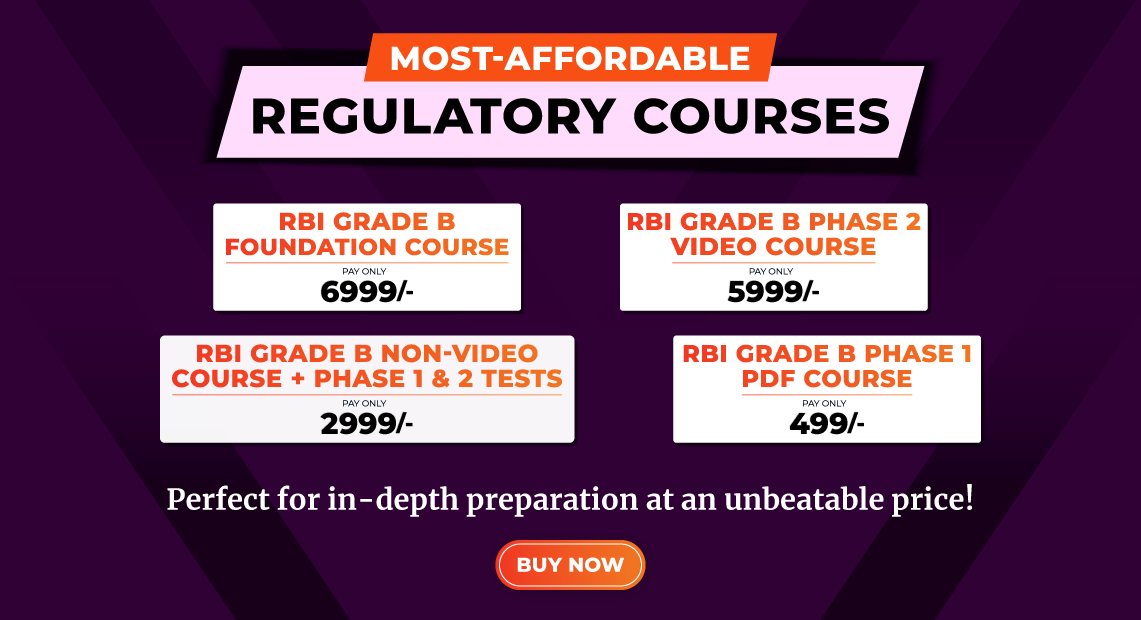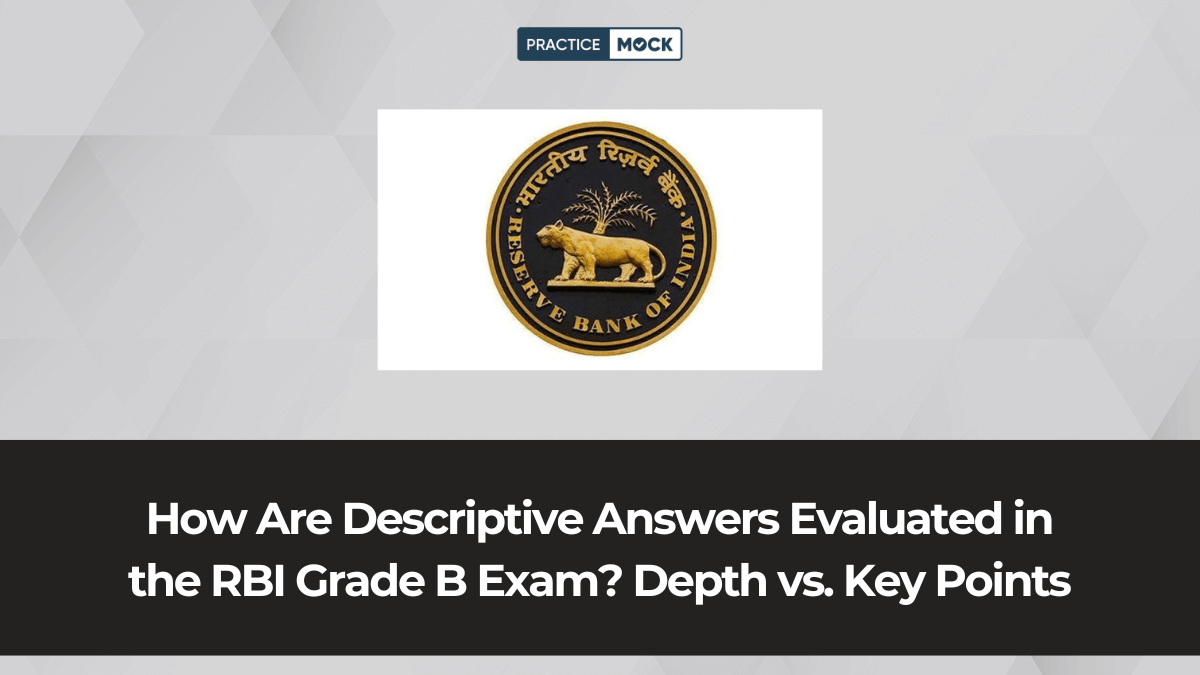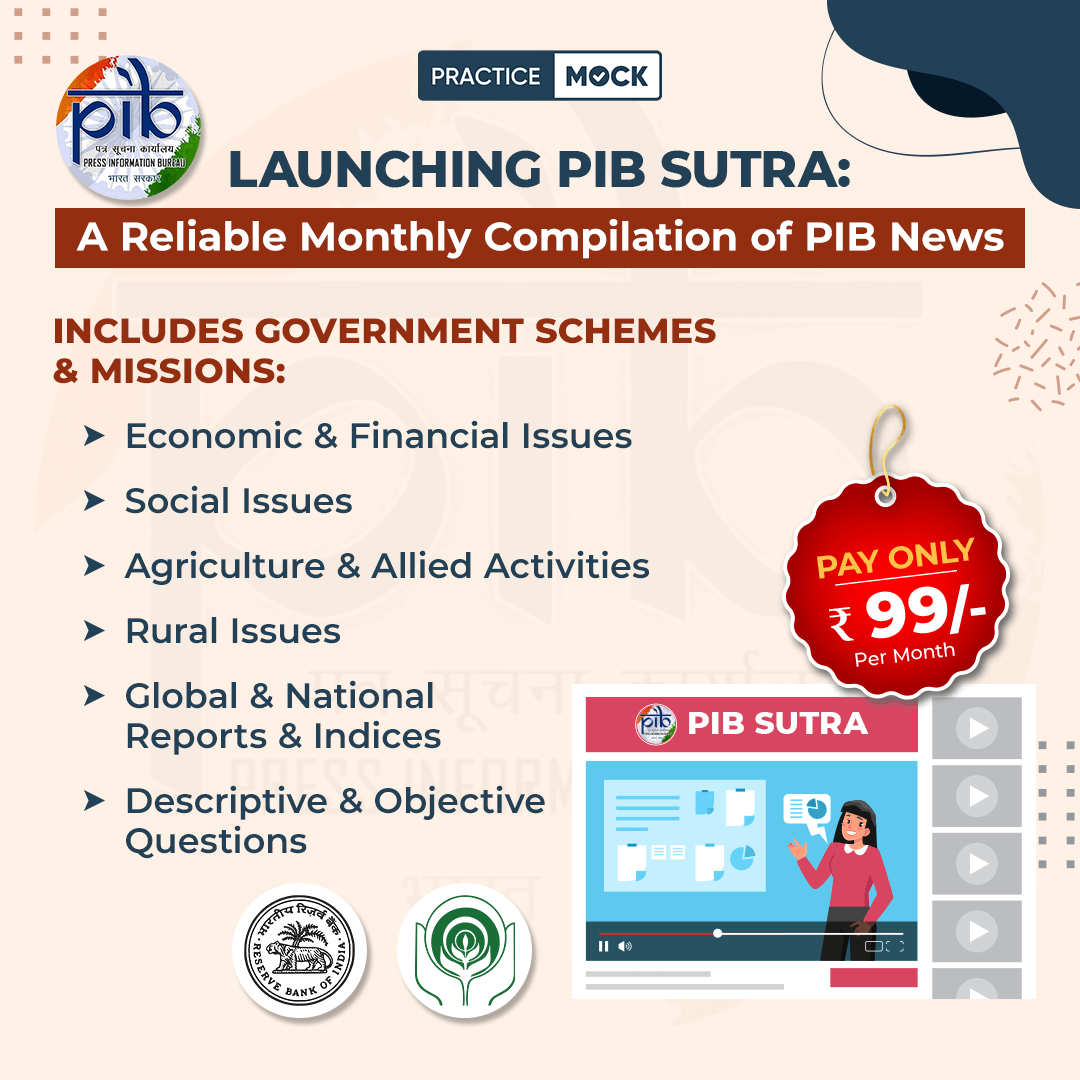If you are preparing for the RBI Grade B Exam 2025, then you will also have to practice writing good descriptive answers. And for this, you will also have to know how descriptive answers are evaluated in this exam. Having this knowledge will help you write better answers. The answers that examiners consider excellent, and for which they give marks generously. Many candidates do not score low in their descriptive answers just because they don’t understand the topic, but because they are not able to craft their answers in the right way. Or, because they didn’t pay attention during exam preparation to what things need to be kept in mind while writing answers. So, to write good answers, should you give deep responses? Or should you focus on the main points? The truth is that you have to maintain a balance between both. Through this blog, you will learn how examiners check your descriptive answers and how to write a high-scoring answer.
Click Here to Check PIB Sutra & Master Current Affairs
RBI Grade B Descriptive Answers Evaluation Pointers
One thing that you have to keep in mind during the practice of descriptive answers is that the descriptive section will not only test your knowledge. It will also examine your ability to understand, your style of explanation, and your capability to write your ideas in a clear and effective manner. That’s why, to master this art, you will have to fully fix all the points given below in your mind. And practice writing answers accordingly. RBI Grade B descriptive answers evaluation is made based on these points.
1. Content Accuracy and Relevance
Your answer must be correct and related to the question. Do not divert from the topic or include information that is not needed. For example, if the question is about inflation, don’t start explaining the stock market. You need to, therefore, write facts that are correct and recent. And whenever you give examples or data, make sure they are accurate. It will help explain your point better.
2. Clarity and Structure
Examiners like answers that are easy to read. So, start with an introduction, then write the main body, and end with a conclusion. So, make sure to cover only one idea in each paragraph. Use simple words and short sentences. This makes it easy for the reader to follow your thoughts. Don’t try to impress with tough words. Just focus on clear communication instead.
3. Balance Between Depth and Main Points
This is the most important part. Important or main points are like the foundation of your answer. So, you must mention them clearly. But you shouldn’t stop there. You have to explain each point in detail. Show that you understand why it (the topic in discussion) matters. On one hand, if you only write main points, your answer may look very basic. On the other hand, if you only analyse the topic deeply, the main idea will get lost. So, you need to find a good balance between both aspects of the answer giving. Your understanding of the topic and your viewpoint on it.
4. Presentation and Language
If you want to make a good impression on the examiner, you need to use good language. Good language will help you make a strong impression. For that, you have to use grammar correctly, avoid spelling mistakes, and write in formal English. It is also important to break your answer into small paragraphs. You should use headings or bullet points wherever needed. Then, when you present your answer neatly, the examiner will think you are serious and professional. But, on the other hand, poor writing or confusing, scattered, or disorganized structure will surely reduce your mark, even if you use an appropriately flowery language.
5. Time and Word Limit Management
Last but not least, you need to stick to the word limit mentioned in the question. If you write too little, your answer can be incomplete, and if you write too much, you’ll waste a lot of time and you’ll deviate from the main idea. Hence, it is essential to practice writing answers within time to improve your speed and accuracy as well. In short, if you write a complete and well-balanced answer in the given word limit, you’ll definitely score more than a long and disorganized answer.
How to Score Good Marks in RBI Grade B Exam
Scoring well in the RBI Grade B exam requires a strategic and disciplined approach. Start by understanding the exam pattern and syllabus thoroughly. The exam consists of three phases: Phase I (Prelims), Phase II (Mains), and the Interview. Focus on clearing Phase I by mastering Quantitative Aptitude, Reasoning, English, and General Awareness. Current affairs, especially related to the economy and banking, are crucial.
For Phase II, concentrate on Economic and Social Issues (ESI), Finance and Management (FM), and English (Descriptive). Read newspapers like The Hindu or The Indian Express daily, and follow RBI reports, Economic Survey, and Budget updates. For FM, use standard books and RBI publications. Practice writing essays and comprehension for the English section.
Mock tests play a vital role—take them regularly to improve speed and accuracy. Analyze each test to identify weak areas. Time management and revision are key; create a realistic study plan and stick to it. Join online forums or groups for peer discussions and insights.
Lastly, maintain a positive attitude and stay consistent in your preparation. With the right strategy and effort, scoring high in the RBI Grade B exam is absolutely achievable.
Evaluation of Descriptive Answers: Key Takeaways
The discussion we had above has made it clear that in the descriptive part of the RBI Grade B exam, if you write such an answer that has a clear chain, is to the point, and also has a good explanation, then no one can stop you from scoring good marks in it. You just have to focus on the depth of the topic, along with the main points in the answer. Like, what effect the topic under discussion can have on our economy or society, and in what ways. So you just have to keep this in mind and write that answer smartly in simple language within the given time. And whenever you practice writing, keep the examiner in your mind. Write such an answer that is easy as well, and one that the examiner cannot ignore.

Join our unique Telegram group immediately to skyrocket your preparation for Regulatory exams via expert guidance, top tips, perfect feedback, and much more!
[ Click Here to join the PracticeMock Telegram Group! ]
[ Click Here to join the PracticeMock Telegram Discussion Group Link! ]
Also, go through the 60 days Study Plan for the RBI Grade B Exam 2025
Related Posts:
RBI Grade B Descriptive Answer Evaluation: FAQs
No, simple and clear language is better.
Yes, if they help organize your answer.
Both are equally important—balance is key.
Yes, they may affect your score.
Yes, always include both for a complete answer.
- Sign Up on Practicemock for Updated Current Affairs, Free Topic Tests and Free Mini Mocks
- Sign Up Here to Download Free Study Material
Free Mock Tests for the Upcoming Exams
- IBPS PO Free Mock Test
- RBI Grade B Free Mock Test
- IBPS SO Free Mock Test
- NABARD Grade A Free Mock Test
- SSC CGL Free Mock Test
- IBPS Clerk Free Mock Test
- IBPS RRB PO Free Mock Test
- IBPS RRB Clerk Free Mock Test
- RRB NTPC Free Mock Test
- SSC MTS Free Mock Test
- SSC Strenographer Free Mock Test
- GATE Mechanical Free Mock Test
- GATE Civil Free Mock Test
- RRB ALP Free Mock Test
- SSC CPO Free Mock Test
- AFCAT Free Mock Test
- SEBI Grade A Free Mock Test
- IFSCA Grade A Free Mock Test
- RRB JE Free Mock Test
- Free Banking Live Test
- Free SSC Live Test




